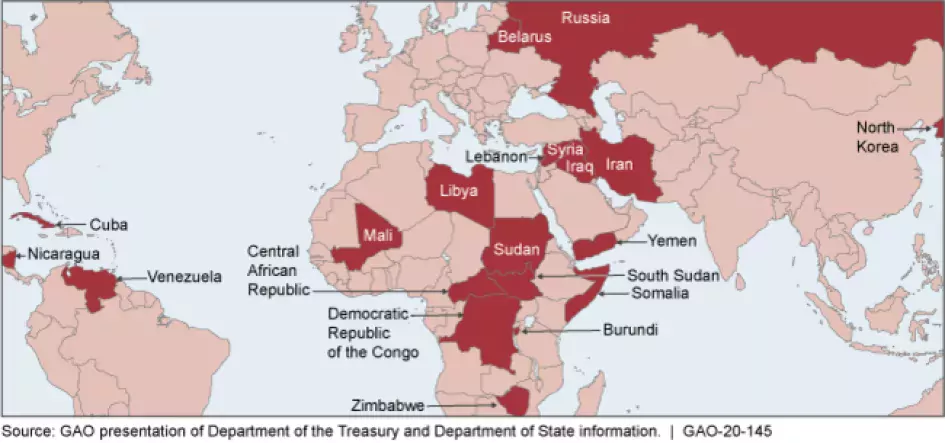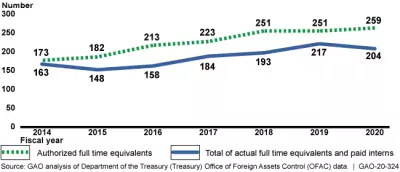The growing use of economic sanctions
The U.S. government has increasingly used economic sanctions as a tool to combat threats to U.S. interests. For example, in recent weeks, the government has sanctioned companies for supporting a Venezuelan regime deemed by the United States to be illegitimate, and sanctioned Nicaraguan and Iranian officials connected with human rights abuses.
In today’s WatchBlog, we look at our recent work on challenges to implementing sanctions, as well as the general effectiveness of economic sanctions.
Current economic sanctions
The United States currently has 32 active programs that sanction individuals, organizations, or countries for things like their support of terrorism, narcotics trafficking, weapons proliferation, or human rights abuses.
Country-Based and Country-Related U.S. Sanctions Programs as of July 2019
Sanctions can include prohibiting an individual or organization from doing business in the United States, seizing bank accounts or other assets held in the United States, or limiting goods that can be imported into a country.
Challenges to implementing sanctions
A number of agencies play a role in implementing these sanctions—including developing policy, identifying targets, and prosecuting violators. Among the 13 agencies we identified, the Departments of Treasury, State, and Commerce each have units dedicated to implementing sanctions.
For instance, Treasury’s Office of Foreign Assets Control (OFAC) is the largest federal office dedicated to implementing sanctions. OFAC’s workload has grown in recent years, and it has received budget increases. However, we found that the agency faces challenges hiring staff due to:
· Competition with other agencies that have legal authority to expedite hiring for in-demand skills
· Competition with the private sector
· The time required to get high-level security clearances for new hires
The effectiveness of sanctions
U.S. agencies also cited challenges in measuring the effectiveness of sanctions. For example, agencies reported that it is nearly impossible to assess the overall effectiveness of sanctions in lowering the amount of narcotics entering the United States. In particular, agencies stated that they cannot isolate the impact of sanctions from other U.S. and international counternarcotics programs.
However, we looked at some academic studies that shed some light on the effectiveness of sanctions. These studies found that sanctions have been more effective if:
· They were implemented through an international organization, like the United Nations
· The targeted countries had some existing dependency on, or relationship with, the United States (such as a trade or military relationship)
Comments on GAO’s WatchBlog? Contact blog@gao.gov.
GAO Contacts
Related Products

GAO's mission is to provide Congress with fact-based, nonpartisan information that can help improve federal government performance and ensure accountability for the benefit of the American people. GAO launched its WatchBlog in January, 2014, as part of its continuing effort to reach its audiences—Congress and the American people—where they are currently looking for information.
The blog format allows GAO to provide a little more context about its work than it can offer on its other social media platforms. Posts will tie GAO work to current events and the news; show how GAO’s work is affecting agencies or legislation; highlight reports, testimonies, and issue areas where GAO does work; and provide information about GAO itself, among other things.
Please send any feedback on GAO's WatchBlog to blog@gao.gov.







